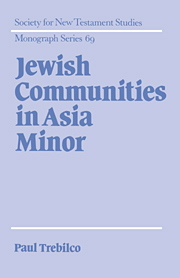Book contents
- Frontmatter
- Contents
- Preface
- List of abbreviations
- Map of Asia Minor
- Introduction
- 1 Jewish communities of Asia Minor in literary sources
- 2 The Jewish communities at Sardis and Priene
- 3 The Jewish community at Acmonia
- 4 The Jewish community at Apamea
- 5 The prominence of women in Asia Minor
- 6 Theos Hypsistos and Sabazios – syncretism in Judaism in Asia Minor?
- 7 ‘God-worshippers’ in Asia Minor
- 8 Jewish community and Greek city in Asia Minor
- Conclusions
- Notes
- References
- Indices
1 - Jewish communities of Asia Minor in literary sources
Published online by Cambridge University Press: 21 October 2009
- Frontmatter
- Contents
- Preface
- List of abbreviations
- Map of Asia Minor
- Introduction
- 1 Jewish communities of Asia Minor in literary sources
- 2 The Jewish communities at Sardis and Priene
- 3 The Jewish community at Acmonia
- 4 The Jewish community at Apamea
- 5 The prominence of women in Asia Minor
- 6 Theos Hypsistos and Sabazios – syncretism in Judaism in Asia Minor?
- 7 ‘God-worshippers’ in Asia Minor
- 8 Jewish community and Greek city in Asia Minor
- Conclusions
- Notes
- References
- Indices
Summary
Josephus, Philo, Cicero, the New Testament and Patristic sources provide us with information concerning the foundation and developing life of Jewish communities in Asia Minor. They will be dealt with here.
Antiochus III and the transportation of Jews to Phrygia and Lydia
Josephus quotes three documents ascribed to Antiochus III, the third of which is a letter to Zeuxis, the governor of Lydia (Ant 12:148–53), written by Antiochus III whilst he was in the East between 212 and 205/4 BCE. He wrote to his strategos Zeuxis with instructions concerning the settlement of 2,000 Jewish families in Lydia and Phrygia in an attempt to maintain internal security in the region, which was beset by unrest. The Seleucids, like other Hellenistic dynasties, founded a large number of colonies or cities throughout their Empire. These foundations began as civilian colonies, garrisons of active soldiers or settlements of retired or reserve soldiers. The particular interests which led to the founding of colonies included the need to protect lines of communication, trade routes or frontier zones and the desire to halt rebellion. The transportation of the Jews to Lydia and Phrygia fits into this general pattern.
The authenticity of the letter has been both impugned and defended. We can note the following points in the debate which favour authenticity. Firstly, the letter is in keeping with the conventional Hellenistic form employed by a king writing to an individual and conforms stylistically to Seleucid documents of the period.
- Type
- Chapter
- Information
- Jewish Communities in Asia Minor , pp. 5 - 36Publisher: Cambridge University PressPrint publication year: 1991

